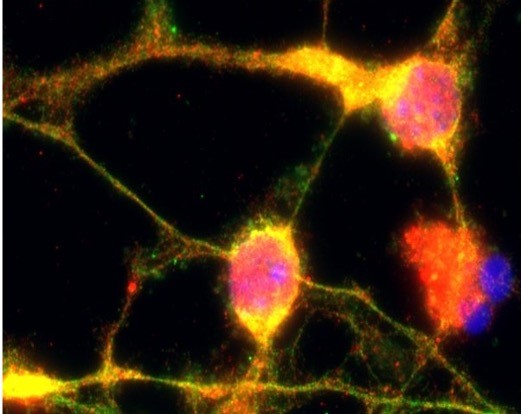Researchers Examine Administration of Vitamin B3 as Treatment for Early Alzheimer’s

April 9, 2025 - A UC Irvine-led team of researchers analyzed the blood and cerebrospinal fluid (CSF) samples from people with early Alzheimer’s Disease to find out how much of a potential drug treatment reached the blood and brain.
The samples were from people enrolled in a double-blind clinical trial studying the effectiveness of high-dose oral nicotinamide (vitamin B3) for improving memory in people with early AD. Called the NEAT trial and conducted by UCI and UC San Diego, it showed that while nicotinamide demonstrated good safety and tolerability, it did not significantly lower tau proteins, the proteins in the brain that form tangles and serve as a biomarker for Alzheimer’s.
The new study, led by UCI biomedical engineering graduate student Gabriel Ketron and his adviser UCI biomedical engineering adjunct professor Gregory Brewer, used mass spectroscopy to look further at these samples to understand why the oral drug was not reaching its target. Their work was published in Alzheimer’s Research & Therapy in March. Nicotinamide had previously been shown to reduce tau proteins in animal models.
“We began this study before the NEAT trial results were complete,” said Brewer, “because we wanted to determine whether the oral drug actually got into the blood and then the cerebrospinal fluid, as a proxy for the brain, where it was needed to possibly improve memory.”
The researchers found that although the high-dose nicotinamide was sufficient to get into the blood, it was being chemically modified by the body in most cases, resulting in inactivation before it reached the cerebrospinal fluid. “Participants showed increased levels of the drug in the treatment arm after 12 months, but inactivation occurred in most of the participants before it could reach the cerebrospinal fluid,” said Brewer.
However, in 29% of the samples that did present elevated levels of nicotinamide in the CSF, tau protein levels favorably decreased by 34 percent. This was compared to the 3% elevation in those who did not have elevated nicotinamide in their CSF, and a 3% decrease for those who received the placebo.
“Tau protein levels dropping among this subgroup of participants who accumulated nicotinamide in their CSF is a good sign,” said Ketron ‘24, who has since graduated with his master’s degree and now works as a research associate data scientist at Cedars Sinai Medical Center. “If all participants who received the drug were to accumulate nicotinamide, we could see a broader drop in tau concentration and improved clinical outcomes.”
Based on these results, the researchers are still optimistic that nicotinamide could be an effective treatment option for early AD. Brewer says the participants with elevated nicotinamide in their CSF probably had lower levels of the inactivation enzyme than those where it failed. “Future efforts could try to add an inhibitor of this enzyme or try another route to give nicotinamide, such as an intranasal spray, like current allergy and migraine medication sprays. The four million American people with AD desperately need better drugs to actually reverse the disease.”
Others involved in the research include Felix Grun and Joshua Grill from UCI, and Howard Feldman and Robert Rissman from UC San Diego. The study was funded by the Institute for Memory Impairments and Neurological Disorders (UCI MIND) and the UCI Foundation.
– Lori Brandt
